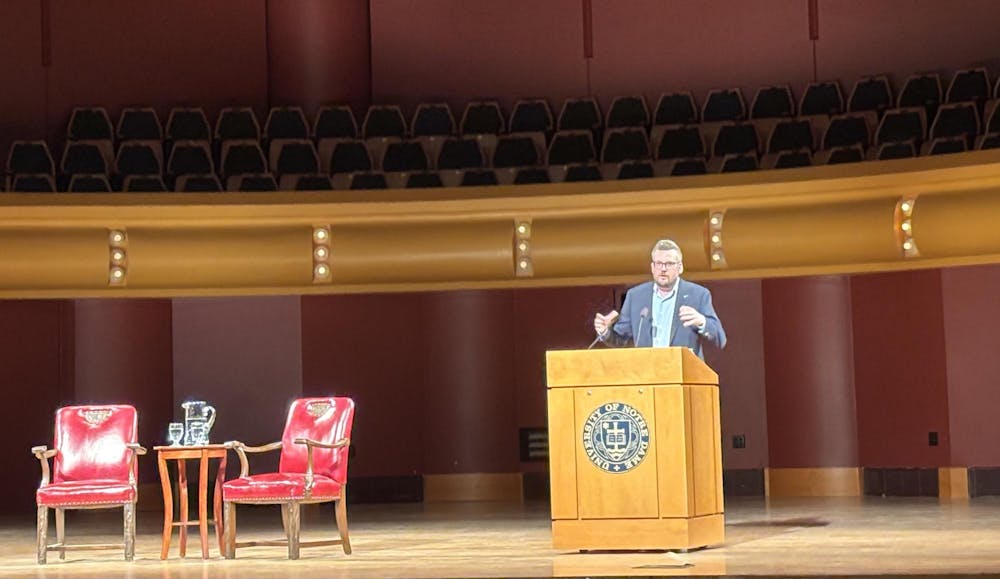Bestselling author, educator and YouTube creator John Green delivered the fifth annual Ruskin Lecture Wednesday evening at Notre Dame, focusing on human existence, the urgency of the climate crisis and the necessity of hope. Hosted by the Reilly Center for Science, Technology and Values, the lecture aligns with the legacy of John Ruskin, an English writer concerned with the intersection of art, philosophy and social justice.
Robert Goulding, associate professor in the program of liberal studies and director of the Reilly Center, contextualized the event’s significance.
“This is the Reilly Center’s annual lecture for undergraduate students, now in its fifth year,” Goulding said. “It’s inspired by the figure of John Ruskin, who was born on Feb. 8, 1819. Every year, we try to hold the lecture as close as possible to that date.”
Goulding introduced Green with a small synopsis on Ruskin’s inspirations for his works, echoing the sentiments and mission of the annual lecture.
“One question seemed to animate him: ‘What can art and the humanities do to address the escalating crisis in which we find ourselves?’” Goulding said. “That remains the inspiration of this annual lecture for our students —the conviction that the arts and humanities must join as equal partners with the sciences and technology if we are to understand what is going on in this world and how we can fix it.”
Green opened his talk with his signature mix of humor and philosophical depth.
“I feel like an elephant who has been asked to speak to an audience of other elephants on the subject of how to be an elephant. But I do not know how to be an elephant. I do not know what is happening. I do not know what is going on and I do not know anything about elephant studies,” Green said, drawing laughter from the audience.
As the lecture progressed, Green explored profound existential themes, addressing the climate crisis and humanity’s fragile but powerful role in shaping history.
“We’re not the first species to become so powerful on Earth that we muck up the climate and threaten the planet’s biodiversity by altering its atmosphere,” he said. “Cyanobacteria caused a mass extinction over a billion years ago. But we are the first species to know what we’re doing while we do it.”
Green also highlighted humanity’s existential dilemma, commenting on our fleeting existence.
“We know that we will end, that like every species, we have a temporal range. And it’s not just that each of us will die, or that everyone we love will die, or that we and everything we love will be forgotten. It’s that all of us, the very idea of us, will cease to exist, along with everything we ever did or made or thought.”
Despite his acknowledgment of the gravity of contemporary global challenges, Green’s message remained one of responsibility and hope.
“I feel like I’m at the end of history, right? Because today is the last day I’ve ever seen. But in fact, I am in the middle of history. You are in the middle of history. And yes, we are being acted upon by historical forces. But it’s also worth remembering that we are ourselves a historical force,” he said.
Green also reflected on the limitations of human power.
“This is the pickle. We are powerful, probably too powerful, but we are also not nearly powerful enough. We are powerful enough to reshape the planet’s climate, but not powerful enough to choose how we reshape it. We are powerful enough to kill our fellow human beings by the millions through war or neglect, but we are not powerful enough to save those we love from suffering,” he added.
Throughout his talk, Green infused theological reflections into his discussion, emphasizing the Christian call to solidarity.
“Integral to that good news is that the last shall be first and that no one should suffer alone or without support,” he said, invoking Sister Marie Augusta Neal. “When we allow ourselves and when we allow others to be proximal to our own suffering and allow ourselves to become more proximal to the suffering of others, we realize that we must respond to crisis with something much more than despair, something instead like radical hope, like faith practiced.”
In an interview with The Observer, Green highlighted how hope is part of the human spirit, even if language is unable to describe its depths.
“I think human hope is always justified despite the reality of suffering, despite the reality of injustice, because there is always hope that the world could get better,” Green said. “And then, secondarily, there’s the hope beyond the veil, I guess. Those are the two hopes that I look to: hope that the world can get better and hope that the world is not the end of us.”










